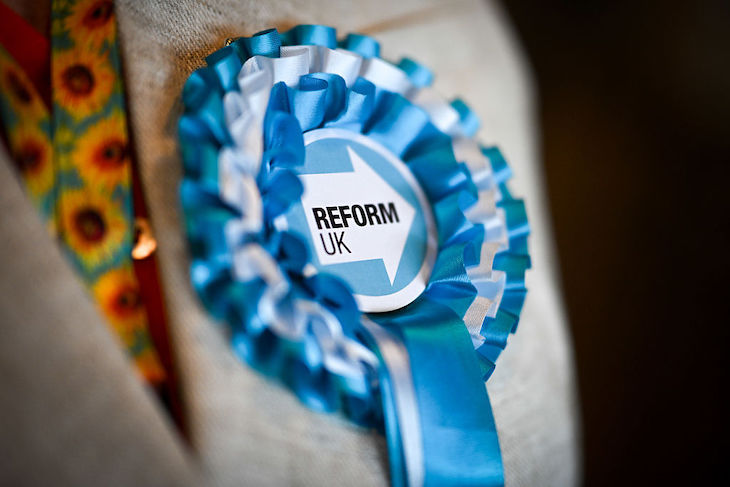It was the most blatant and shameless piece of virtue signalling I’d ever seen. After a long day of training at a government department a couple of years ago, we went for a drink off Whitehall and talked politics. Suddenly, out of nowhere, one of my fellow trainers took a card out of her bag and proudly displayed it to us, her eyes beaming with anticipation of our admiration and approval. What was it? A Labour party membership card. ‘Isn’t this perfect evidence of my superiority as a human being?’, her eyes said, as she turned to each of us in turn. She looked like she wanted a round of applause.
If the shy-Tory phenomenon has been a big thing for decades, it’s a mere stroll in St James’s Park compared to the shy-Reformer version
Well, I just wanted to vomit. But it was revealing of the left-right dynamic in this country. Many lefties believe that theirs is a virtuous, moral crusade, that they are better human beings as a result, and that they therefore have every right to advertise their excellence.
Conservatives? It can be the opposite. Hence the phenomenon known as ‘shy Tories’, which leads many Conservative voters to keep schtum in public, even when questioned anonymously by opinion pollsters, only coming clean once in the privacy of the polling booth. In fact, so pronounced is this shy-Tory phenomenon that opinion polls routinely under-estimate how well the Conservatives will perform at general elections. The Tories did better than predicted in 2024, 2019, 2015 and 1992, and Labour performed worse. I can only recall 2017, May versus Corbyn, when most pollsters under-estimated the Reds.
But if the shy-Tory phenomenon has been a big thing for decades, it’s a mere stroll in St James’s Park compared to the shy-Reformer version. I spend a lot of time conducting communication-training courses for organisations up and down the country, from consultancies, retailers, manufacturers and banks, through to government departments and charities. Over the last 15 months, I’ve met many folk within these organisations who will happily volunteer, without prompting, that they support Labour, the Lib Dems and, increasingly, Greens. A tiny number admit (overcoming shyness) to being Tories. But never once has anyone told me that they support Reform.
How can that be, when Reform leads by such a comfortable margin in every single poll, and about a third of people report they’ll vote Reform at the next election? Is it just by extraordinary coincidence I’ve not met a single one of them at work? Of course not. The reason nobody tells me they support Reform is because they think, at work, it would be unacceptable to say so. Possibly career-threatening, in some organisations. Better to keep silent.
And for all I know, they might be right to play it safe. If Keir Starmer feels emboldened to describe Reform’s policies as ‘racist’ then you can be sure that’s what a lot of other people think too. In fact, this is what a contact of mine – like me, a mainstream Brexit-supporting Conservative voter – said to me yesterday: ‘I would think ill of someone who voted Reform. My gut reaction would be that they were probably a bit thick and possibly racist.’ And here’s the comment of another politically engaged contact, a Remain voter, I talked to today: ‘To find out what Reform voters think, you need to slum it with the lower orders and the great unwashed’.
Wow. Pretty extreme. And Reform voters no doubt viscerally resent this insulting, lazy characterisation. Who wouldn’t? Even I, not a Reform supporter, find myself deeply offended on their behalf. But my experience – and I’m speaking only of the work context here – is that Reform voters might also think that it’s best not to risk getting their heads shot off. Best to stay silent and take their revenge in the polling booths.
But could the impact of all this be that the opinion polls, already putting Reform in the mid-30s, actually underestimate the party’s support? Could the shy-Reformer phenomena mean that Reform will actually do even better than the pollsters predict, just like the Tories have typically out-performed expectations?
The pollsters are no doubt trying to allow for this shyness, just as they try to with the Tories. But it’s devilishly difficult. And it’s tough for the rest of us to appreciate just how much Reform support is out there when the party’s voters are made to feel like a nasty virus, and their honestly-held views pushed underground.
Sadly, playing the man and not the ball is all too common in political discourse. But it’s deeply counter-productive. Let’s by all means examine and critique Reform’s proposals and policies. But using terms like racist, gammon and low life? If all you can do is resort to that kind of language, you might be in for a nasty surprise come 2029.







Comments